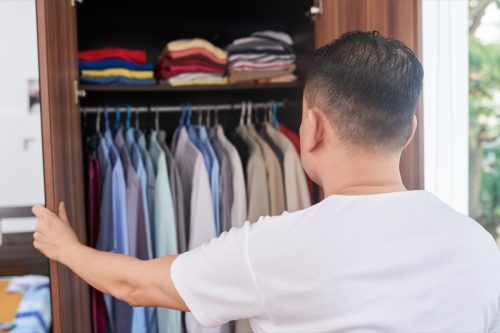Is a 30-Day Spending “Detox” the Trick to Saving? Finance Experts Weigh In

Inflation may officially be down, but prices of most goods and expenses are still higher than ever and show no signs of easing. As the holiday season approaches—notoriously not exactly a thrifty time of year—it’s natural to want to squirrel away as much as you can. Enter the money-saving trick finance influencers swear by called the “spending detox.”
Also known as a “no buy month” or a “no spend month,” the basic idea is pretty straightforward: Cut out superfluous purchases for a month. Essentially, it’s Dry January for your bank account. But does a spending detox actually work? And can it really get your savings into a (more) stable place? Here are four things you need to know about how to successfully do a spending detox, straight from the experts.
RELATED: Couple in $285K Debt Made 3 Common Money Mistakes You Should Avoid, Self-Made Millionaire Says.
1
Set ground rules.

The first thing you need to do to start a spending detox is to set some ground rules for yourself, as detailed by a viral TikTok video from budgeting expert Elyse Lyons, a finance influencer who promotes money-saving tricks under the Savvy Sagittarius moniker on social media.
Here are Lyons’ rules: no new clothing, no new home décor items, no toys (unless it’s for holiday shopping), and limiting takeout to just once per week.
When completing the 30-day detox herself, she only made plans to go out twice, once to a concert (where the tickets were already purchased and the budget was capped at $25) and once for a night out (with a budget capped at $50). She rounded these off with a strict adherence to her usual grocery and gas budget.
Your rules needn’t be exactly the same—money of course means different things to different people—but the general goal of making rules for yourself and sticking to them for 30 days is the core tenet of a spending detox.
RELATED: Never Use Your Credit Card for These 6 Purchases, According to Financial Experts.
2
Be prepared for a tough two weeks.

The first two weeks of a spending detox are the toughest, according to Christina Mychas, a finance influencer who promotes the bona fides of a minimalist lifestyle across social media and at Minimalist-ish.
“For the first two weeks, you pretty much are in withdrawal,” Mychas says in a recent TikTok video. “If you’re used to spending your time or soothing yourself with shopping, to relieve boredom, anxiety, anything like that, when you’re not doing it, your body is kind of like, ‘What are you doing?'”
RELATED: 8 Things You Should Stop Buying If You’re Middle Class, Financial Experts Say.
3
Fight the FOMO.

“The thing I learned is there’s always going to be something to want,” Mychas says in another TikTok video recounting her recent spending detox. “If you tend to really get caught up in fear of missing out, or fear of missing a good deal, or ‘There’s the last one in my size,’ just know that that’s really temporary.”
Mychas recommends holding off making purchases and giving yourself a couple of days to let any urges simmer down. “I guarantee you’re probably going to forget about it,” she says. “Something else is going to come along that you’re going to want more, and that feeling of wanting and urgency is going to start all over again.”
RELATED: The 13 Best Ways to Make Money Online, Experts Say.
4
See if you have it first.

Many people with shopping habits tend to want new things without much consideration for what they already have. If you’re a habitual shopper—particularly one who keeps up with trends and regularly buys clothing—there’s a good chance you already have an enviably stylish closet.
An easy way to make your existing wardrobe feel fresh is to try to mix and match your existing pieces in new ways, creating complete outfits you’ve technically never worn before.
“I stopped feeling this sense of urgency or this idea that something was missing from my wardrobe,” Mychas explains of her spending detox. “I found myself shopping my own closest instead—or not even thinking about shopping at all.”
For more financial advice delivered straight to your inbox, sign up for our daily newsletter.
Best Life offers the most up-to-date financial information from top experts and the latest news and research, but our content is not meant to be a substitute for professional guidance. When it comes to the money you’re spending, saving, or investing, always consult your financial advisor directly.